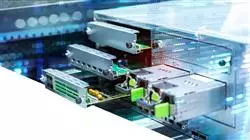University certificate
The world's largest faculty of information technology”
Why study at TECH?
Become an expert in Cloud Infrastructure Governance, with the most complete theoretical and practical content in the academic market"

One of the most relevant areas in the area of Cloud Infrastructures is compliance with technical requirements and technological legislation. In addition, it is also necessary to take into account the regulatory differences depending on the location, since Cloud Computing can be accessed at any geographic location. For all these reasons, professionals in this area who master the administration and governance services are increasingly necessary to optimize the use of resources and ensure compliance with security requirements.
For this reason, TECH has designed a Postgraduate diploma in Cloud Infrastructure Governance, to provide students with the skills and knowledge necessary to meet the challenges they may encounter in Cloud governance. And this, through a syllabus that addresses topics such as Service Management, Security and Compliance Challenges, the Cloud Governance Standard or Certifications and Accreditations in Cloud Environments.
All this, with the possibility of combining it with daily activities and other work, without limitations of any kind, thanks to a convenient 100% online mode, which allows students to organize themselves as best suits them. Besides, offer a very complete multimedia content, the most updated information and the most innovative teaching tools.
Enroll now and delve deeper into your knowledge of security and compliance challenges”
This Postgraduate diploma in Cloud Infrastructure Governance contains the most complete and up-to-date program on the market. The most important features include:
- The development of practical cases presented by experts in Cloud Infrastructures Governance
- The graphic, schematic, and practical contents with which they are created, provide practical information on the disciplines that are essential for professional practice
- Practical exercises where self-assessment can be used to improve learning
- Its special emphasis on innovative methodologies
- Theoretical lessons, questions to the expert, debate forums on controversial topics, and individual reflection assignments
- Content that is accessible from any fixed or portable device with an Internet connection
Get to know all the features of Privacy in the Americas, Asia Pacific, Middle East or Africa, with the most dynamic and comprehensive multimedia materials”
The program’s teaching staff includes professionals from sector who contribute their work experience to this educational program, as well as renowned specialists from leading societies and prestigious universities.
Its multimedia content, developed with the latest educational technology, will allow professionals to learn in a contextual and situated learning environment, i.e. a simulated environment that will provide immersive education , programmed to prepare for real situations.
The design of this program focuses on Problem-Based Learning, by means of which professionals must try to solve the different professional practice situations that are presented to them throughout the academic year. For this , purpose, students will be assisted by an innovative interactive video system developed by renowned experts.
Learn all about Privacy, Approvals and Regulatory Frameworks in Cloud Environments, in just 6 months and with total freedom of time"

Organize your own way and acquire new skills in terms of Laws and Regulations in Cloud Environments"
Syllabus
This Postgraduate diploma in Cloud Infrastructure Governance has been created and designed by TECH's team of experts in the field. In addition, each part of the syllabus has been based on the efficient pedagogical methodology of Relearning, which guarantees the best assimilation of the contents by students, in a dynamic and natural way, without the need to spend too much time studying.

A syllabus designed under the requirements and demands of the most innovative and efficient pedagogical methodology, Relearning”
Module 1. Transformation of IT Infrastructures Cloud Computing
1.1. Cloud Computing Cloud Computing Adoption
1.1.1. Computing
1.1.2. Cloud Computing Adoption
1.1.3. Types of Cloud Computing
1.2. Cloud Computing Adoption. Adoption Factors
1.2.1. Adoption Factors of Cloud Infrastructures
1.2.2. Uses and Services
1.2.3. Evolution
1.3. Cloud Computing Infrastructures
1.3.1. Cloud Computing Infrastructures
1.3.2. Types of Infrastructures (IaaS, PaaS, SaaS)
1.3.3. Types of Implementation (private, public, hybrid)
1.3.4. Elements (hardware, storage, network)
1.4. Cloud Computing Infrastructure: Operation
1.4.1. Virtualization
1.4.2. Automation
1.4.3. Management
1.5. Cloud Computing Ecosystem
1.5.1. Observability and Analysis
1.5.2. Procurement.
1.5.3. Orchestration and Management
1.5.4. Cloud Platforms
1.6. Services Management in Cloud Infrastructures
1.6.1. Service Orientation
1.6.2. Standard and Ecosystem
1.6.3. Types of Services
1.7. Cloud Infrastructure Management Automation
1.7.1. Ecosystem
1.7.2. DevOps Culture
1.7.3. Infrastructure as Code (Terraform, Ansible, Github, Jenkins)
1.8. Security in Cloud Infrastructures
1.8.1. Ecosystem
1.8.2. DevSecOps Culture
1.8.3. Data Science
1.9. Preparation of the Cloud Infrastructure Management Environment
1.9.1. Data Science
1.9.2. Preparation of the Environment
1.9.3. First Steps
1.10. Cloud Infrastructures Future and Evolution
1.10.1. Cloud Infrastructures Challenges
1.10.2. Evolution of Cloud Infrastructures
1.10.3. Challenges in Security and Compliance
Module 2. Government in Cloud Infrastructures
2.1. compliance with in Cloud Environments
2.1.1. Shared Responsibilities Model
2.1.2. Laws, regulations and contracts
2.1.3. Audits
2.2. The CISO in Cloud Governance
2.2.1. Organizational Framework. Figures of the CISO in the Organization
2.2.2. Relationship of the CISO with the data processing areas.
2.2.3. GRC strategy against Shadow IT
2.3. Cloud Governance Standard
2.3.1. Previous assessments
2.3.2. Cloud service provider compliance
2.3.3. Personnel obligations
2.4. Privacy in Cloud Environments
2.4.1. Consumer and User Relationship with Privacy
2.4.2. Privacy in the Americas, Asia Pacific, Middle East and Africa
2.4.3. Privacy in the European context
2.5. Approvals and Regulatory Frameworks in Cloud Environments
2.5.1. American approvals and frameworks
2.5.2. Asian approvals and frameworks
2.5.3. European approvals and frameworks
2.6. Certifications and accreditations in Cloud Environments
2.6.1. America and Asia Pacific
2.6.2. Europe, Middle East and Africa
2.6.3. Global
2.7. Laws / Regulations in Cloud Environments
2.7.1. CLOUD Act,HIPAA, IRS 1075
2.7.2. ITAR, SEC Rule 17a-4(f), VPAT/Section
2.7.3. European regulation
2.8. Cost control and billing in Cloud Governance
2.8.1. Pay-Per-Use Models Costs
2.8.2. Figure of the CFO and FinOps Profiles
2.8.3. Cost control
2.9. Tools in Cloud Governance
2.9.1. OvalEdge
2.9.2. ManageEngine ADAudit Plus
2.9.3. Erwin Data Governance
2.10. Corporate Governance
2.10.1. Code of Conduct
2.10.2. Whistleblower Channel
2.10.3. Due Diligence
Module 3. Infrastructure as a Service (IaaS)
3.1. Cloud Computing Abstraction Layers and their Management
3.1.1. The Abstraction. Core Concepts
3.1.2. Services Models
3.1.3. Management of Cloud Services. Benefits
3.2. Construction of Architecture. Core Decisions
3.2.1. HDDC and SDDC. Hypercompetition
3.2.2. Market
3.2.3. Working Model and Professional Profiles Changes
3.2.3.1. Figure of the Cloudbroker
3.3. Digital Transformation and Cloud Infrastructures
3.3.1. Cloud Work Demo
3.3.2. The Role of the Navigator as Tool
3.3.3. New Device Concept
3.3.4. Advanced Architectures and the Role of the CIO
3.4. Agile Management in Cloud Infrastructures
3.4.1. Life Cycle of New Services and Competitiveness
3.4.2. Development Methodology of Apps and Microservices
3.4.3. Relationship between Development and IT Transactions
3.4.3.1. Use of Cloud as Support
3.5. Cloud Computing Resources I. Identity, Storage and Domain Management
3.5.1. Identity and Access Management
3.5.2. Secure Data Storage, Flexible File and Database Storage
3.5.3. Domain Management
3.6. Cloud Computing Resources II. Network, Infrastructure and Monitoring Resources
3.6.1. Private Virtual Network
3.6.2. Cloud Computing Capabilities
3.6.3. Monitoring
3.7. Cloud Computing Resources III. Automation
3.7.1. Serverless Code Execution
3.7.2. Message Queuing
3.7.3. Workflow Services
3.8. Cloud Computing Resources IV. Other Services
3.8.1. Notification Queuing
3.8.2. Streaming Services and Transcoding Technologies
3.8.3. Turnkey Solution to Publish APIs for External and Internal Consumers.
3.9. Cloud V Computing Resources. Data-Centric Services
3.9.1. Data Analytics Platforms and Automation of IT Manual Task
3.9.2. Data Migration
3.9.3. Hybrid Cloud
3.10. LaaS Services Practice Lab
3.10.1. Exercise 1
3.10.2. Exercise 2
3.10.3. Exercise 3

Access all the main material and a wide variety of additional information, to become a Cloud Governance expert”
Postgraduate Diploma in Cloud Infrastructure Governance
If you are an IT professional looking to enhance your skills in cloud infrastructure governance, a Postgraduate Diploma in Cloud Infrastructure Governance may be an excellent option for you. This specialized teaching program is designed to provide you with the skills and knowledge necessary to manage and govern an organization's cloud infrastructure, enabling you to deliver a high-quality and efficient service. During the Postgraduate Diploma in Cloud Infrastructure Governance you will gain specialized knowledge of cloud infrastructure architecture, resource management, cloud data security and privacy, as well as skills to manage and govern the use of an organization's cloud infrastructure. One of the advantages of studying a Postgraduate Diploma in Cloud Infrastructure Governance is that you will be able to specialize in an area that is in high demand within the IT field. The cloud is becoming increasingly important in the business and government world, which means that there is a high demand for computer scientists with specialized skills in the administration and governance of cloud infrastructures.
Become a specialist in Cloud Infrastructure Governance
In addition, a Postgraduate Diploma in Cloud Infrastructure Governance can provide you with many career opportunities in different sectors, such as banking, industry, education and government. In short, if you are a computer scientist looking to improve your skills in cloud infrastructure governance, a Postgraduate Diploma in Cloud Infrastructure Governance can be an excellent choice for you. With this specialized program you will be able to acquire the skills and knowledge needed to manage and govern an organization's cloud infrastructure, which will allow you to excel in your career and have more job opportunities. Don't hesitate to consider this educational option to advance your career as a computer scientist!







